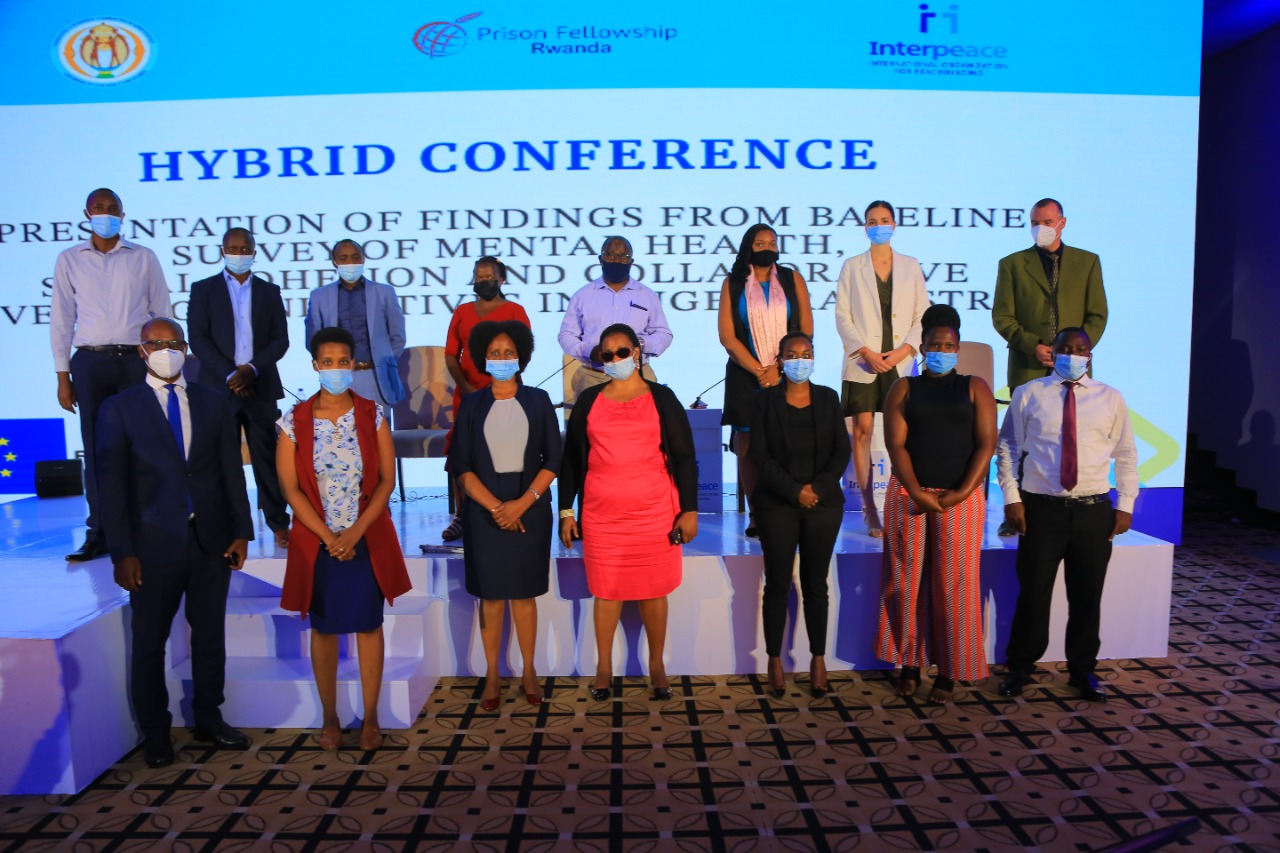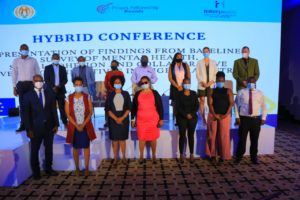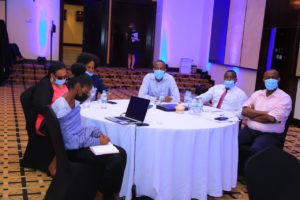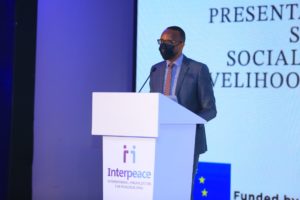Rwanda: new findings and protocols to improve mental health and social cohesion

Studies show a high prevalence of mental health disorders in Rwanda. This imprint of the 1994 genocide against the Tutsi has made reconciliation and societal healing difficult. During a hybrid conference in the capital Kigali, on 2 September 2021, Interpeace and partners presented findings from baseline research carried out on mental health and societal healing in Bugesera District.
The conference was organised by Interpeace, in partnership with the National Unity and Reconciliation Commission (NURC) and Prison Fellowship Rwanda (PFR). It was supported by the European Union (EU) through its embassy in Rwanda.
During the event, participants also discussed the development of several protocols, informed by this baseline survey, to assess ongoing efforts and intervene on issues related to mental health, social cohesion, and sustainable livelihoods in Rwanda.
Since the genocide against the Tutsi, Rwanda has gone through 27 years of sustained development and growth. However, the country continues to grapple with significant mental health challenges. A considerable proportion of the Rwandan population lives with trauma linked to the genocide against the Tutsi.
“My mother is always lonely. When I ask her a question about what happened during the genocide, she immediately goes to the room and cries, and I feel sad because there is nothing I can do to help her feel better,” said one participant of the baseline study.
This is exacerbated by psychological and socioeconomic distress which have contributed to disrupt social cohesion. These prevailing mental health conditions have made it difficult to rebuild trust and reconcile people in Rwanda.
“Bugesera has suffered a lot from the genocide against the Tutsi. Traumatised people have difficulties to forgive and trust each other, and to embrace development and sustainable livelihoods,” said Richard Mutabazi, Mayor of Bugesera District.
However, the government of Rwanda and local civil society organisations have already made significant investment and progress towards trauma healing, social cohesion and improving livelihoods. To support these ongoing efforts, the National Unity and Reconciliation Commission, Prison Fellowship Rwanda and Interpeace started implementing the pilot phase of a societal healing programme in Bugesera District, which was the hardest hit by the genocide against the Tutsi. This baseline study on mental health and societal healing was part of this programme, launched in October 2020.
“We wanted to assess the current state of communities in Bugesera District, in relation to mental health, social cohesion and collaborative livelihoods, and then use the data as a basis to develop intervention protocols for the district and beyond,” explained Frank Kayitare, Interpeace Rwanda and Great Lakes Representative. He added: “We have gained invaluable input from government and non-governmental organisations. These inputs have made our programme more responsive; allowing for a potentially more resilient outcome.”
The presentation of this study’s results at the conference, on 2 September, marked the completion of the first stage of this pilot programme, known as ‘’Reinforcing community capacity for social cohesion and reconciliation through societal trauma healing in Bugesera District’’.
“We are very happy to see this project come to fruition after multiple discussions that started on this very important topic between Interpeace, the government, the EU and other partners over a year ago,” said H.E Nicola Bellomo, EU Ambassador in Rwanda.
The mental health challenge in Rwanda is multidimensional. Lack of remorse and forgiveness, impunity, and poverty were all cited in the research as factors that underlie mistrust between social groups. Another important aspect revealed by the study was the challenge to successful reintegration of convicted genocide perpetrators who have completed their prison term. Specifically, it was found that reintegration is very often an extremely challenging experience, for the former perpetrators but also for the communities receiving them. Issues of social stigma, rejection by the family, and inability to sustain livelihoods were most frequently reported among released ex-prisoners. These social challenges faced by ex-prisoners compound problems caused by a long period of incarceration, which include loss of social and professional identity, erosion of family relationships and emotional expression, and loss of hope in the future.
“Challenges at community level are not only one-dimensional and require collaborative effort. What is happening in Rwanda is a ground-breaking and shining example. We should think of scalability of these initiatives for a better outcome,”, said Dr Theo Hollander, Senior Regional Representative for Eastern and Central Africa at Interpeace.
- Credits: Interpeace
In terms of livelihoods, the baseline survey revealed evidence of economic hardship. People struggle to survive as well as they can in adverse circumstances. A key challenge that emerged from the study is low agricultural production contributing to food insecurity. Reliance on rain-fed farming, insufficient access to irrigable land, limited use of fertilizers, and limited ownership of livestock, all contribute to this challenge. Residents inevitably rely on markets to supplement their food supplies, which in turn pushes young people into menial labour roles in order to generate the required cashflow, reducing their availability to participate in education and training. Vocational skills were found to be lacking in the district, with the vast majority of respondents reporting that their only vocational skill is farming with basic tools.
“Our goal in Rwanda is to develop comprehensive interventions, blend Rwandan home-grown solutions with international best practices and utilize multiple types of evidence to improve mental health,” said Ntwali Jean Paul, Deputy Executive Director of Prison Fellowship Rwanda.
The study additionally assessed gender and youth perspectives and dynamics in terms of mental health, family relations, prisoner reintegration, and livelihoods. The study found that women in Bugesera district were deeply affected by the genocide, through various direct and indirect pathways. Regarding mental health, the study found that more women than men reported problems with anxiety and depression. With respect to the inter-generational transmission of genocide legacies, the study identified two major challenges for young people; the first is growing up in a family in which the parents suffer from extensive psychosocial issues due to their traumatic experiences, to the extent that it undermines their capacity as parents. The second is the difficulty for parents to discuss events and experiences that often cause their children to feel confused, angry, or insecure.
“Mental health is crucial to advance social cohesion in Rwanda. Teams from Interpeace Rwanda, the National Unity and Reconciliation Commission, the Ministry of Health and Prison Fellowship Rwanda have been supporting Rwandans and the government to address these mental health challenges and trauma and we are committed to do more with our partners,” said Scott Weber, President of Interpeace.
The results of the baseline survey have informed the development of several new protocols for assessment and intervention, which will guide further efforts related to mental health, social cohesion, and sustainable livelihoods in Rwanda. The set of protocols included a holistic mental health and psychosocial care intervention combining Rwandan home-grown solutions with international best practices. Specifically, the screening protocols aimed to assess the community population and assign participants in interventions, based on their individualized needs. Among other developed protocols, there is a resilience-oriented therapy protocol and socioemotional skills curriculum for mental health care; multi-family healing space and adaptations on the sociotherapy protocols for social cohesion; prisoners’ risk and resilience assessment and prisoners’ rehabilitation protocols and reintegration roadmap; as well as collaborative livelihoods protocol to guide the community-based enterprises development.
Please follow this link and listen to the conference recording: https://spoti.fi/3zOnMod
Our societal healing programme in Rwanda enhances capacities of communities through an innovative and holistic approach to expand investment in mental health, address trauma and advance social cohesion. The programme is funded by the EU through its instrument contributing to stability and peace (IcSP).




